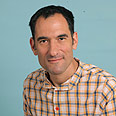
Ziv Tidhar
Our leftist Holocaust deniers
Op-ed: Palestinian national tragedy bears no resemblance whatsoever to Nazi extermination machine
International Holocaust Remembrance Day was marked this week. Seemingly, we Israelis have no need for another remembrance day. The Shoah is ubiquitous here, the whole year. Indeed, our youths are becoming less familiar with the details as result of the ongoing decline in teaching hours, yet this is not the heart of the problem in our national effort to cope with the Shoah's memory.
Just like seasonal flu, upon the arrival of remembrance days Israel's media is overcome by a murky wave of opinion pieces by Israeli Shoah-denying intellectuals. I am not referring, heaven forbid, to people who deny the extermination of millions. Even professional holocaust-deniers overseas have changed their rhetoric a while ago.
The local Shoah-denier is inspired by the radical Left in the world's most prestigious academic institutions. He engages in dwarfing the implications of the Shoah and in minimizing its relative weight as a constitutive event that has no parallel in the history of humanity.
Through verbal juggling, the denier turns the victim of the Holocaust into a belligerent thug who must be restrained, silenced, and preached to. To that end, the term "Shoah trauma" in its various conjugations will be used as a means for explaining the sickening conduct of the Jews living in Israel today. These people, who experienced the Shoah on their own flesh, as well as their descendents, are accused of refusing to leave behind this "post-trauma," which is said to cloud their overall judgment.
The alleged manifestations of this are uncontrollable angry outbursts directed at the weak, be it a new immigrant, a Palestinian or a foreign worker. Notably, Israel's crimes are seen as equal to Nazi crimes. Current-day European states are seen as an enlightened model, a symbol of moderation and tolerance, as if these people are not the ones who not so long ago were responsible for the peak of human barbarity. Indeed, facts and figures do not confuse Holocaust deniers.
Even if Israel is a model of tolerance given the conditions it faces, and even if the national conflict it 's embroiled in exacts fewer casualties than any similar conflict worldwide, we shall always hear the argument that Shoah survivors are obligated to adhere to "other" standards not demanded of any other nation. This creates new demonization of the victims and again deprives them of their natural right for self-determination or a secure sovereign existence, without bombs and missiles exploding at every street corner, and without an uncontrollable flow of foreign masses eliminating the state's national definition.
Twisted parallel
For Holocaust deniers, the "Shoah trauma" is not an emotional experience that calls for compassion and stands in and of itself, but rather, merely an argument used by Israelis as an excuse for their "narrative," which faces the "Palestinian narrative." The latter also offers a trauma in the form of a "Nakba," translated as "Shoah" to Hebrew.
There are no similarities whatsoever between the German extermination machine and the Palestinian national tragedy, yet the twisted parallel is almost explicit when "post-Shoah paranoia" is enlisted as an explanation for Israeli aggression.
The open and explicit threats to eliminate the State of Israel, growing global anti-Semitism, and the extermination ideologies that are being taught again – this time at schools located only a few kilometers away from here – are presented not as a realistic translation of reality, but rather, as merely reflecting the abovementioned paranoia.
These Shoah deniers argue that without the Holocaust, the State of Israel would not have been established as result of the pressure exerted on the nations of the world by the paranoid Jews. These nations are said to have been pushed, against their will, to approve the inception of the new state in sin, while perpetuating a conflict that Israelis refuse to terminate (as noted, because of that same "post-trauma.")
This is how the well-oiled Holocaust denial machine works. This is how Shoah discourse is being dwarfed and minimized. Instead of a discussion on universal implications, we get a constant trickle of the Middle Eastern context, for the purpose of making the crimes of occupation and militarism seem graver.
Israel was not established because of the Shoah. The Zionist enterprise has moral validity even without the Holocaust. The denier will always cheapen and dwarf the Shoah's universal implications in order to produce a narrow, localized debate, while slamming and abusing the survivors as the last to learn the "lesson." Meanwhile, there are people worldwide who read the words written by these Israeli Shoah deniers, quote them, and rush to send them an invitation for the next academic convention.
Ziv Tidhar is an architect and radio announcer
.










